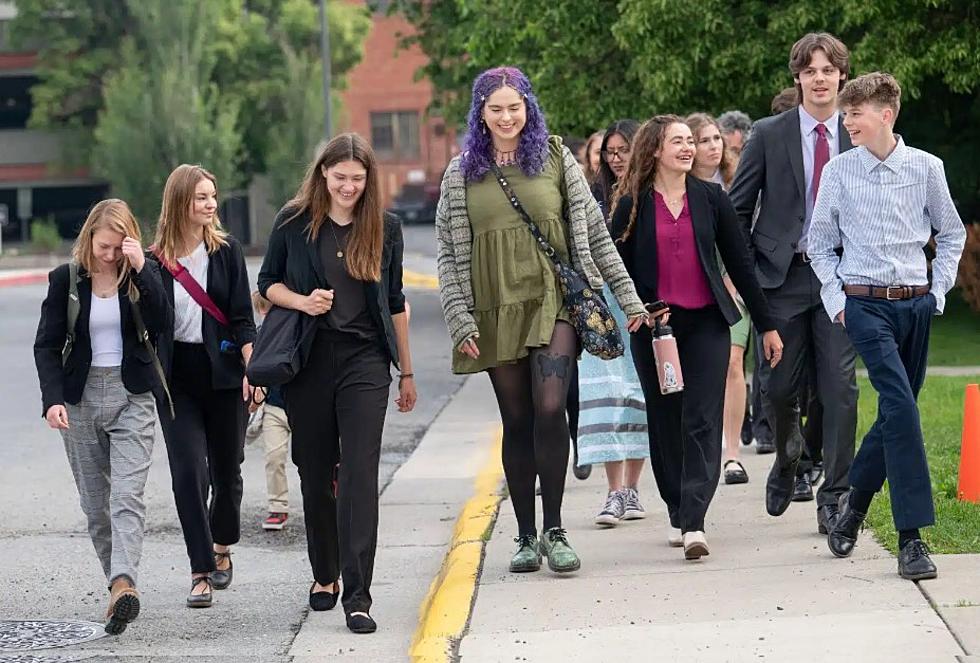
Youth-led climate change trial in Montana continues
Hillel Aron
(CN) – Montana's landmark climate change trial continued on Tuesday, as the court heard testimony from experts and teenage plaintiffs.
Montana, the fifth-largest coal producing state and 12th-largest oil producing state, has an unusual clause in its constitution. Article IX reads: "The state and each person shall maintain and improve a clean and healthful environment in Montana for present and future generations."
This clause is at the center of the lawsuit Held v. Montana, filed in 2020 by 16 plaintiffs, now ages 5 to 22, which seeks to compel the state to include climate change as an impact in its environmental impact statements when approving new development projects, as other states already do.
In his opening statement, the plaintiff's attorney also urged Judge Kathy Seeley to enjoin Montana officials "from approving fossil fuel activities." At very least, he said, the judge should issue a ruling that declares the state in violation of Article IX of its constitution.
Attorneys for Montana have said that their state is little more than a "spectator" in the global climate crisis, and that its emissions are "simply too minuscule to make any difference."
The second day of the bench trial saw the testimony of Cathy Whitlock, a climate science expert who teaches at Montana State University.
"Montana's climate has been warming steadily as the result of burning fossil fuels," said Whitlock. She explained that the state's average temperature has risen 2.7 degrees Fahrenheit since 1950 — a faster rate than that of the whole country (in general, areas at high latitudes and those further from an ocean are warming faster).
Montana, she said, would continue to get even warmer in the future. Under one pessimistic projection, which assumes that greenhouse gas emissions are not cut, the state could get nearly 10 degrees hotter relative to 1971.
Such a future, she said, would mean, on average, another 60 days of temperatures over 90 degrees. It would mean warmer winters too, with far less snow and snowpack.
It would wreak havoc on the local economy — farming and ranching would be far more difficult, thanks to summertime drought conditions and the increased likelihood of wildfires. It would also radically change recreational activities in Montana, especially hunting, fishing and snowboarding.
During cross examination, Montana's attorney tried to get Whitlock to admit that Montana's responsibility for the climate crisis is a relatively small one.
"If Montana stopped emitted CO2 today, would you agree that that it would not have an impact on global greenhouse gasses?" the lawyer asked.
Whitlock disagreed. "Every ton that Montana emits, it affects the climate," she said.
The defense attorney also tried to get Whitlock to say how hard it would be for Montana — a large, sprawling state with a relatively small population — to ween itself off of fossil fuels. The lawyer pointed out how expensive it would be to line the highways with charging stations for electric cars.
"As we stand here right now, we’re kind of stuck to what we got, right?" the lawyer asked.
Whitlock seemed to reluctantly agree with the lawyer, but she pushed back during redirect later on.
"No, I think this is a very exciting time," she clarified. "There’s so much change going on."
It was another example of the fine line the plaintiffs' witnesses, and indeed many other climate activists, have sought to walk. They've aimed to describe the direness of the climate crisis and the desperate need for change, while at the same time not projecting a sense of hopelessness.
Two of the plaintiffs testified on Tuesday, both teenagers who withheld their last names. Those were Mica K., age 14, and Badge B., age 15.
Badge said that skiing in the winter was his "favorite thing ever." The thought of Montana's snow gradually dissipating due to climate change made him feel "very depressed."
"Snow is a very important part of my life," Badge said. "I would like my future children to be able to experience skiing the same way I do."
The last witness of the day was Dr. Lori Byron, a pediatrician and climate activist. Byron testified as an expert witness about the effect climate change has on children.
"Youth are being harmed by the climate, disproportionately, when compared to adults," she said, "both physically and psychologically."
Children — that is, those under 21 years of age — breathe faster than adults, which means that they are affected more by air pollution.
They have a higher basal metabolic rate, which means it's harder for them to cool their bodies down, and it takes them longer to acclimatize. Byron cited a report she coauthored which found that "children have a higher risk of dying or becoming ill due to extreme heat."
Byron pointed out that five of the plaintiffs, including Mica, have asthma or other respiratory problems, which make them more susceptible to wildfire smoke and increased levels of pollen in the air.
A number of the plaintiffs, including Mica, have said that they're scared to have children of their own, for fear of what the earth might look like in the coming decades.
"It’s a really common concern," said Byron. "I hear that all the time."
Byron will take the stand again on Wednesday. The trial is expected to last until the end of next week.
